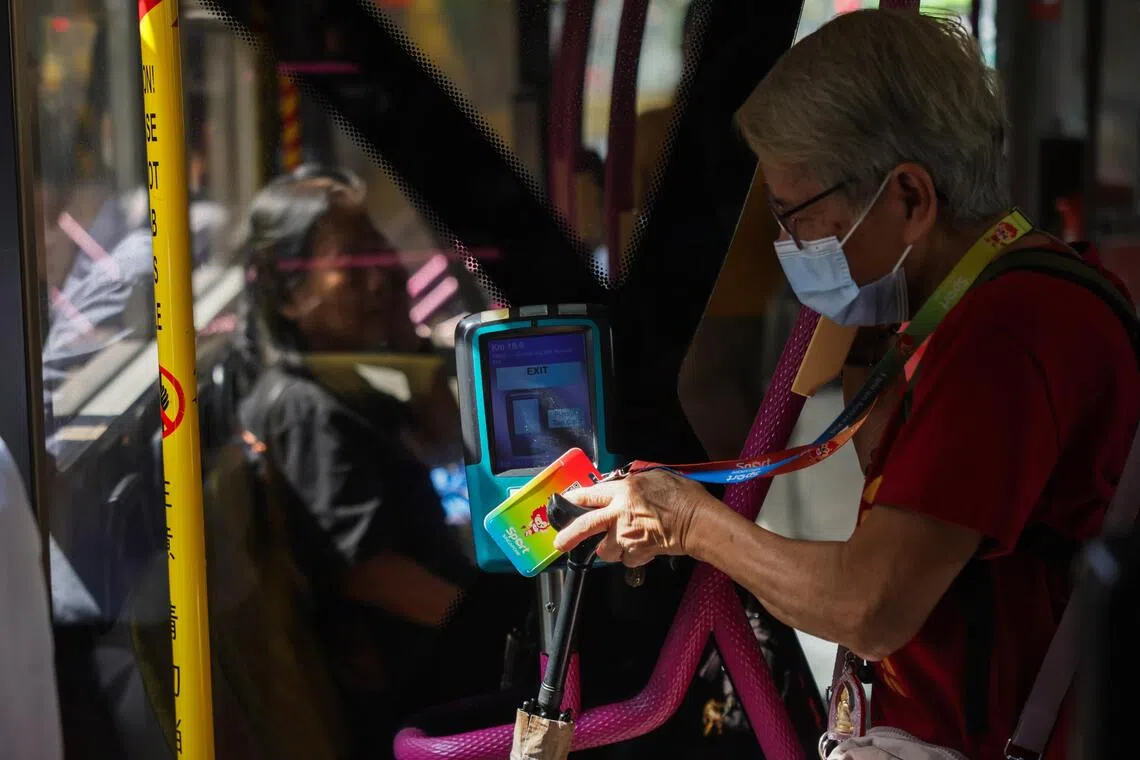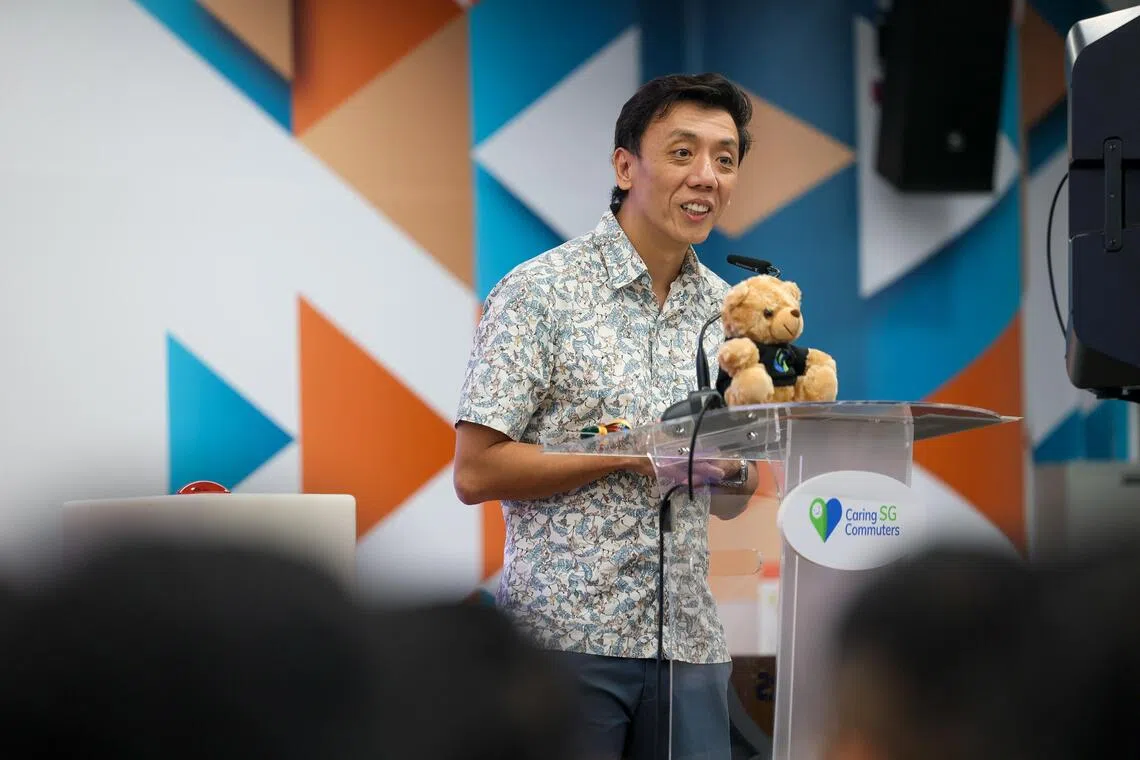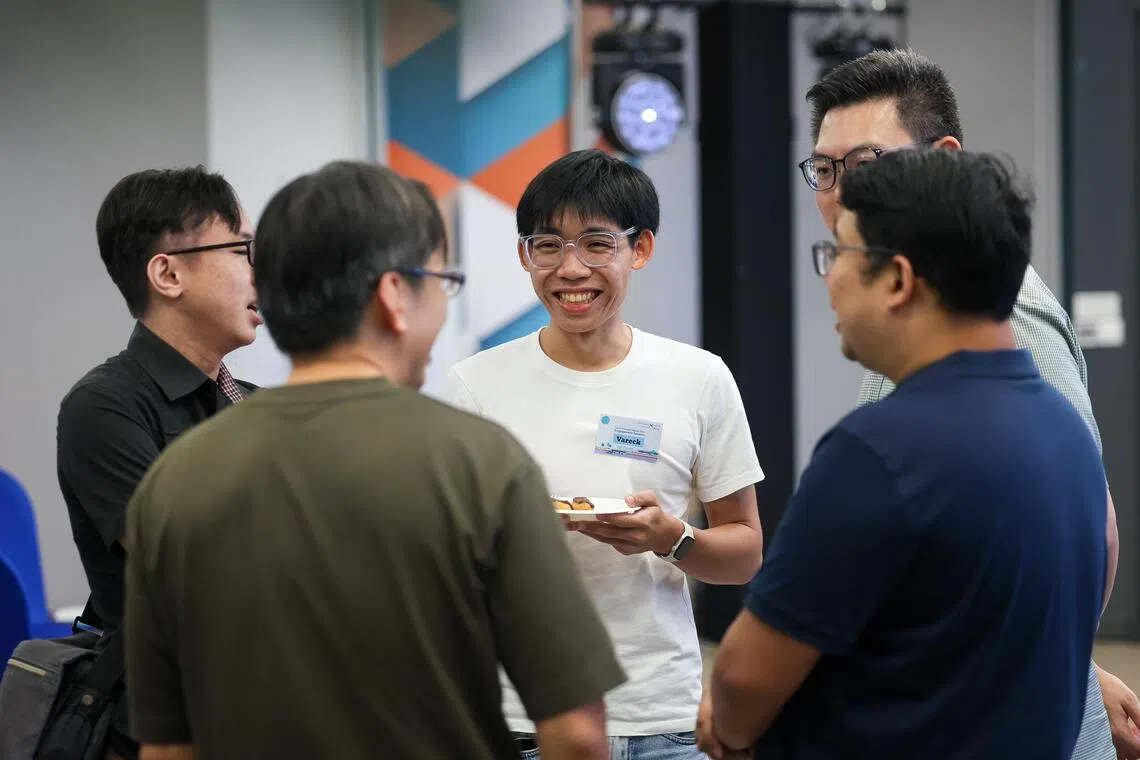LTA starts largest engagement exercise to hear from commuters
Sign up now: Get ST's newsletters delivered to your inbox

Public transport users can take part in new rounds of public discussions to improve transport and mobility in Singapore.
ST PHOTO: GIN TAY
SINGAPORE - Commuters interested in suggesting ways to improve transport and mobility in Singapore can do so, as the Land Transport Authority (LTA) has launched a nationwide public consultation exercise to refresh its Land Transport Master Plan (LTMP).
Announced by Acting Minister for Transport Jeffrey Siow at the Caring Commuter Week 2025 launch event at Our Tampines Hub on Nov 15, the engagement exercise will run over a 12-month period.
Calling it LTA’s largest outreach exercise to date, Mr Siow said he hopes that more Singaporeans will feel a sense of ownership and work with the LTA as partners to shape the future of transport.
Slated for release in 2027, the refreshed LTMP
An LTA spokeswoman said it is not a deviation from LTMP 2040, but a refresh to “keep the long-term vision aligned with today’s realities to remain future ready, people-centred and sustainable”.
The LTA said engagement sessions will focus on reviewing priorities in the light of emerging needs, including new developments located farther from existing transport nodes.
To address the diverse mobility needs of Singaporeans, LTA will also gather views on the impact of new technology such as artificial intelligence and autonomous vehicles, as well as explore ways to improve the safety and inclusivity of walking, cycling and public transport.
Finding common ground in transportation
As public transport is not just about the “hardware”, but also about the people and community, Mr Siow said, empathy is key to building a caring culture in this space.
Some passengers, however, focus on their individual experiences and overlook the viewpoints of others, he noted.
Citing recent feedback on a new bus route in Choa Chu Kang, he said some passengers had asked for shorter journey times, but objected when told this could mean removing bus stops near their homes.
He added that mothers travelling with young children have also e-mailed him to share their struggles when bus captains ask them to fold strollers on crowded buses.
“This situation occurs when the bus is full, and there is a wheelchair user already on the bus who has no alternative,” he explained, adding that he sympathises with these mothers, who are often carrying heavy bags as well.
To cater to both needs, public transport should be inclusive, ideally providing sufficient space to accommodate both a stroller and a wheelchair safely, Mr Siow said.
However, if this cannot be achieved, it is important that passengers show understanding when bus captains request adjustments by either party to make space for the other, he stressed.
“That is why conversations are so important. When people share their experiences and perspectives, and listen to one another... that is where we can find common ground,” said Mr Siow.
Consultations across the island
LTA will hold face-to-face and online discussions for public transport users to share their transport needs and aspirations.
To support this, LTA has launched a refreshed LTMP webpage
It will also engage schools, community groups, industry partners and other stakeholders through talks, competitions and other activities.
LTMP consultations were last held in 2018, and involved more than 7,400 Singaporeans. An LTA spokeswoman said it hopes to engage even more.

Acting Minister for Transport Jeffrey Siow announced on Nov 15 the launch of public consultations over a 12-month period to improve transport and mobility in Singapore.
PHOTO: LIANHE ZAOBAO
The inputs that shaped LTMP 2040 proposed an inclusive, “car-lite” vision
One of the participants at the first dialogue session on Nov 15, Mr Vareck Ng, 23, uses multiple modes of transport.

Music teacher Vareck Ng (in white), 23, suggested ways to improve long-distance connectivity during the engagement session held on Nov 15.
SPH Media Limited
Though he has a driver’s licence, he prefers not to drive every day. Instead, he cycles from home to the MRT station, takes a train, and then uses a shared bike to continue to the school where he teaches music.
Mr Ng suggested having more bus services that cover longer distances on expressways.
For example, his route on the North-South line to get from Jurong East to Toa Payoh is a long journey, passing through Woodlands along the way.
“A direct express bus running along the PIE could cut the journey to about 20 minutes, and it would also free up space on train segments for people who really need it,” he said.
Key measures from the master plan being rolled out now include the expansion of the rail network, the building of more cycling paths, the upgrading of transport infrastructure and a shift towards cleaner-energy vehicles.
At the Nov 15 event, Mr Siow also launched the inaugural Young ChangeMakers – Caring SG Commuters Grant. The initiative by the Public Transport Council and National Youth Council will fund youth-led projects that promote a more gracious and caring commuting culture, with seed grants of up to $7,000.
Also present at the event was Minister of State for Transport Baey Yam Keng, who joined Mr Siow to present awards to 16 individuals and three organisations that have contributed to building a more caring commuting culture.
Calling on Singaporeans to build a shared, common vision of transport, Mr Siow said that ultimately, transport is not just about moving faster or more efficiently.
“It is whether we are moving together as one people.”



